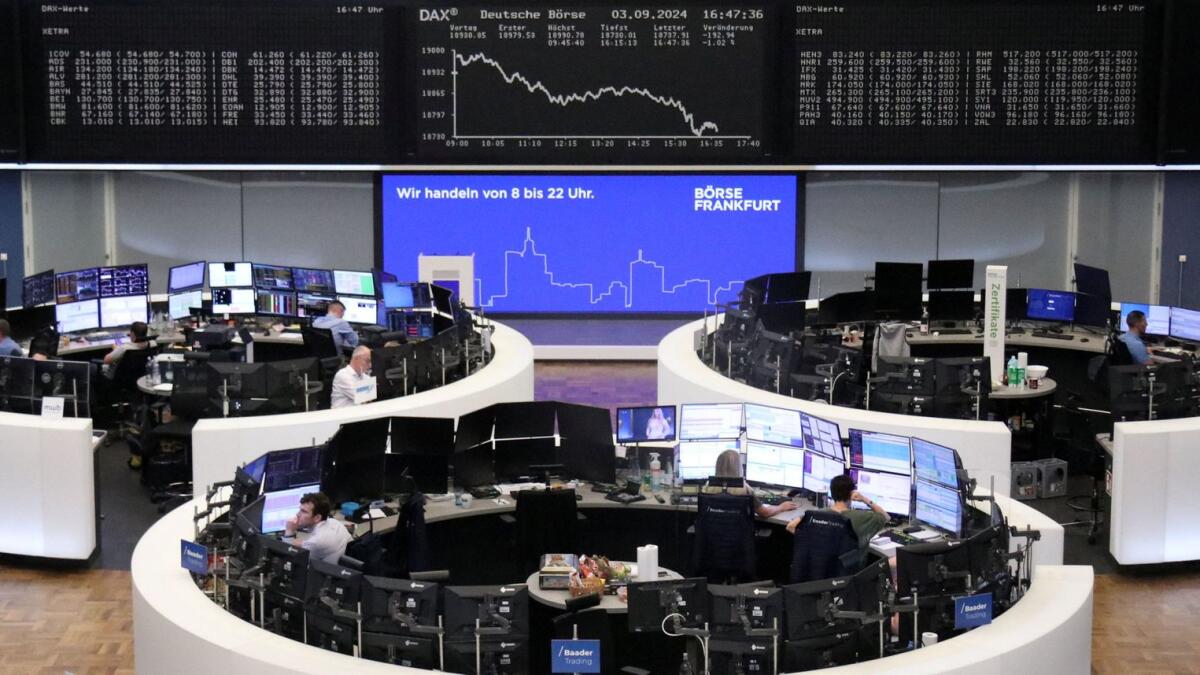Shares fell globally on Wednesday, impacted by a drop in tech stocks triggered by a record sell-off for U.S. chipmaker Nvidia and concerns surrounding fading global growth. This caused European shares to shed 1%, with major markets in London, Paris, and Frankfurt down between 0.6% and 0.9%. Semiconductor companies were the biggest losers, with ASML Holdings dropping 5.4%. Furthermore, Wall Street closed lower on Tuesday, with artificial intelligence darling Nvidia sinking by a record $279 billion as investors turned cautious about AI-related stocks.
The MSCI world equity index, which tracks shares in 47 countries, fell 0.5%. September has historically been a poor month for stocks, with analysts attributing the recent market rout to various factors such as weak U.S. manufacturing data. Investors have noted spiking volatility as liquidity returns to markets following the summer. Brent crude futures fell 0.6% to $73.34 a barrel, near their lowest levels since December. Concerns over a sluggish outlook in China, the largest oil importer, and a potential global economic slowdown are contributing to the decline in oil prices.
Euro zone government bonds held gains, with German Bund yields registering their largest one-day fall in a month. In Asia, stock benchmarks in Tokyo and Taipei led the slump, each falling more than 4%. Asian tech stocks were hit hard, with Japanese chip-testing equipment maker Advantest and Taiwan’s TSMC experiencing significant losses. The safe-haven Japanese yen strengthened by as much as 0.4% against the dollar, while the dollar remained flat, supported by bids for safety.
The prospect of U.S. economic data scheduled for release this week, including figures on job openings, jobless claims, and the non-farm payrolls report on Friday, is compounding the lower appetite for risk in the market. The Federal Reserve’s focus on the labor market could determine the size of the expected rate cut this month. Economists polled by Reuters anticipate a rebound in job growth with an addition of 160,000 jobs in August. Moves in currencies and U.S. Treasuries ahead of the data releases were less volatile compared to equities, with the benchmark 10-year U.S. Treasury yield falling nearly two basis points to 3.82%.
Overall, the global stock market experienced a significant decline on Wednesday, fueled by a sell-off in tech stocks, particularly Nvidia, and concerns over slowing global growth. This led to European and Asian markets facing losses, with semiconductor companies being particularly affected. The decline in oil prices and the strengthening of the Japanese yen as a safe-haven asset also reflect the prevailing risk-off sentiment in the market. Investors are closely watching upcoming U.S. economic data releases to gauge the potential impact on the Federal Reserve’s decision regarding interest rates.










